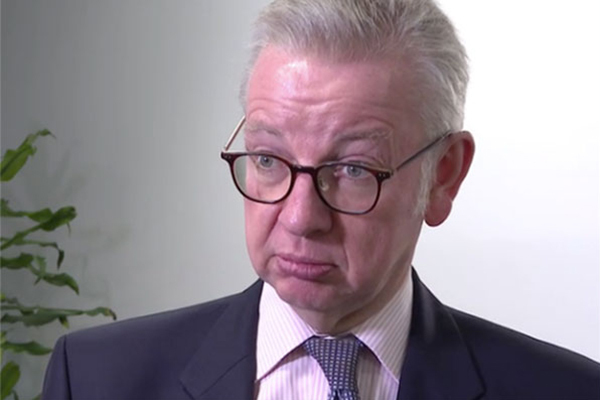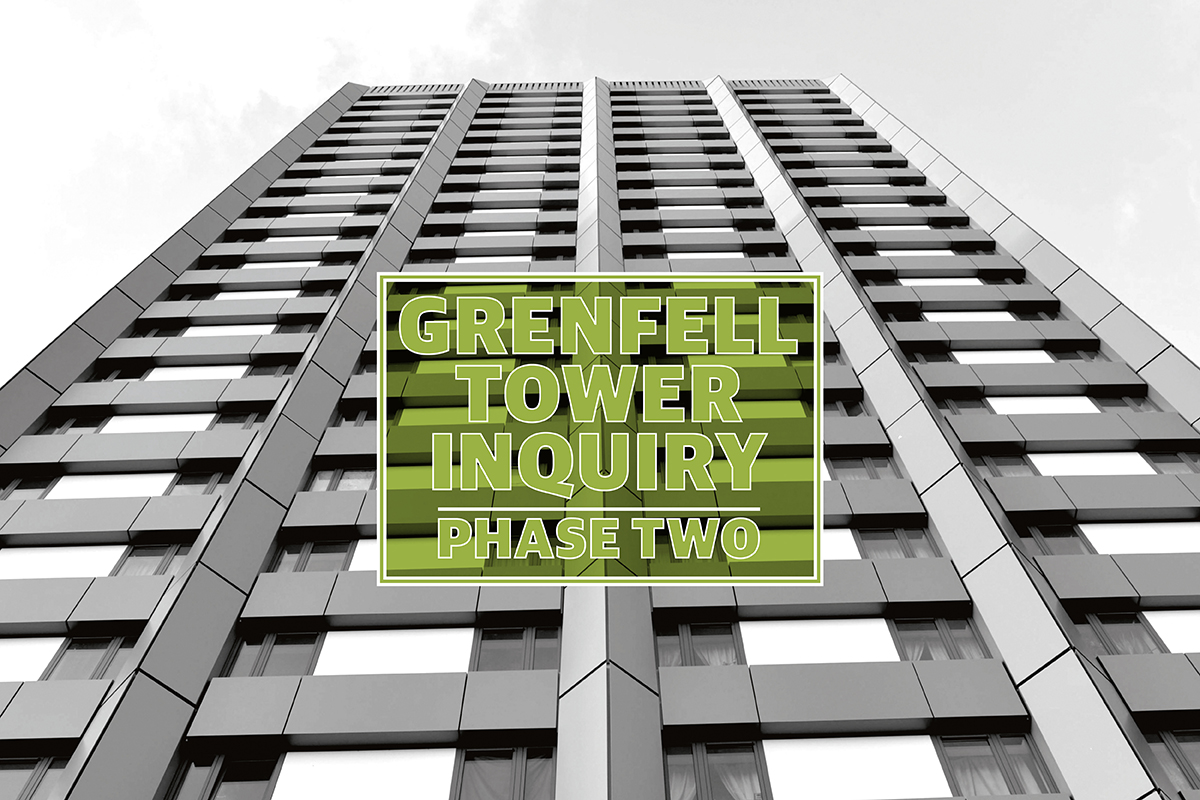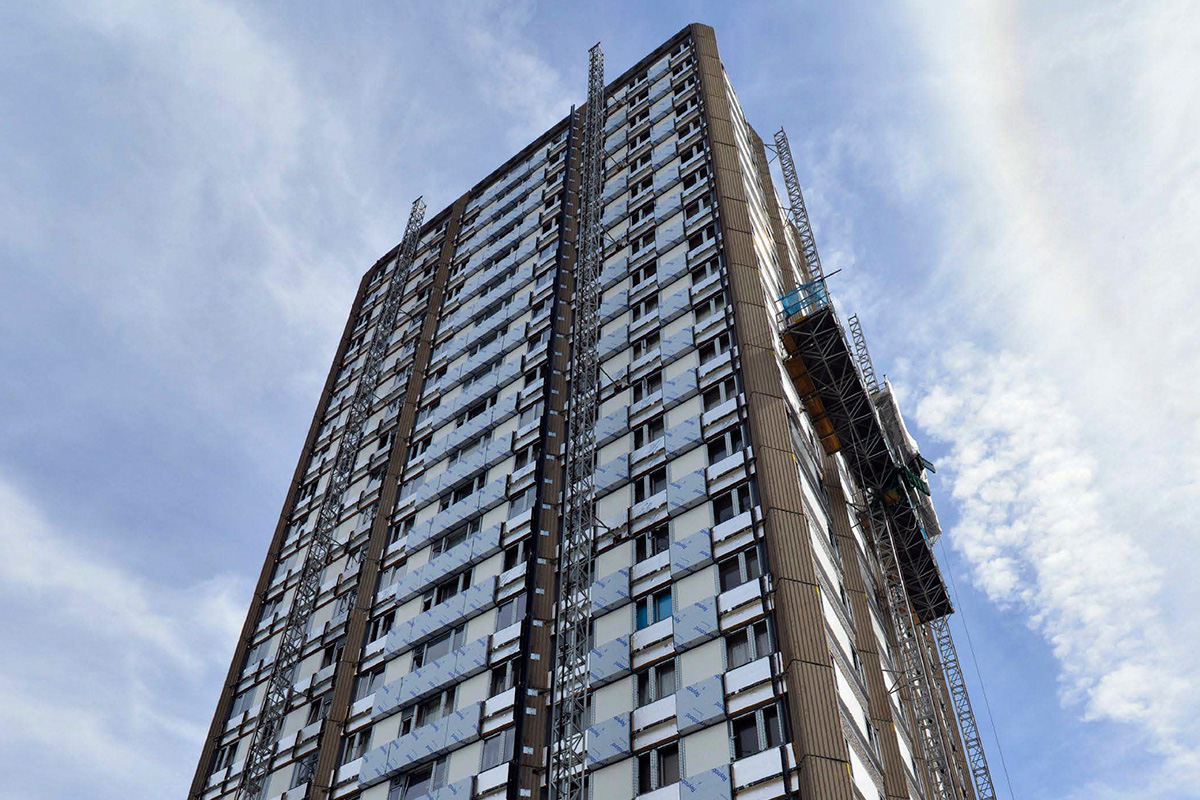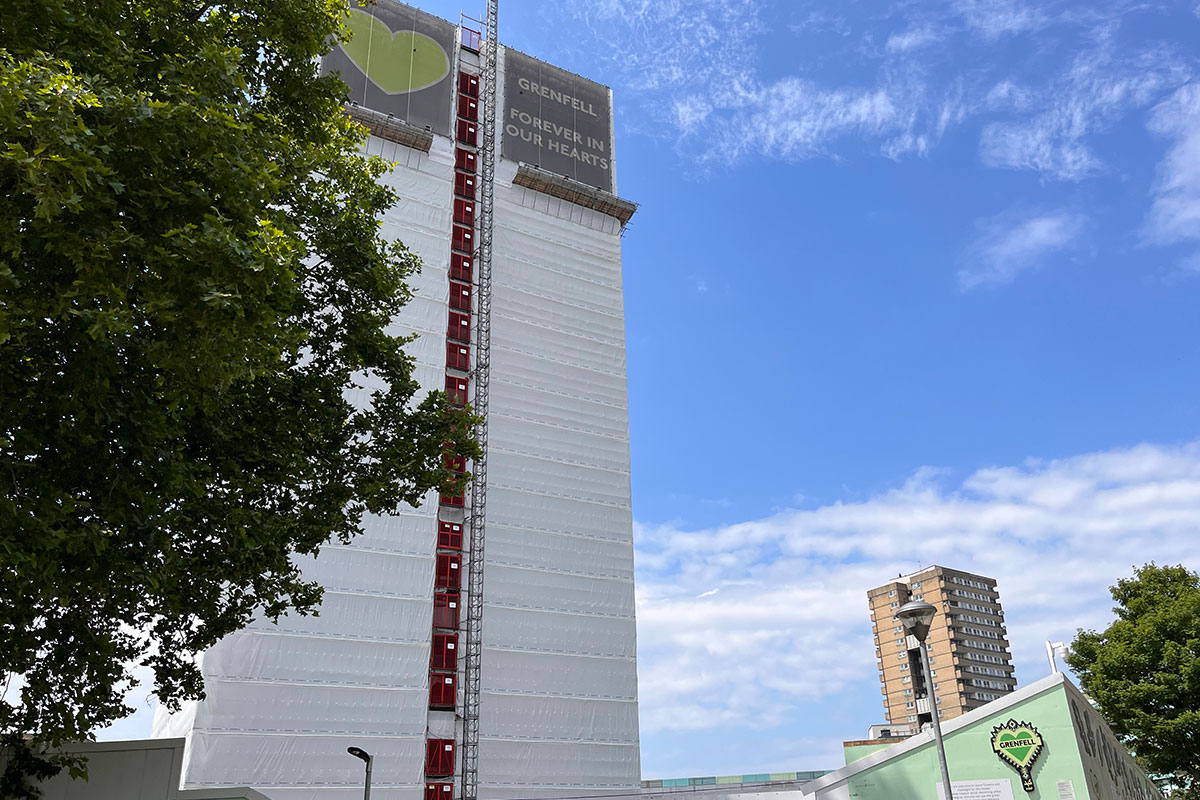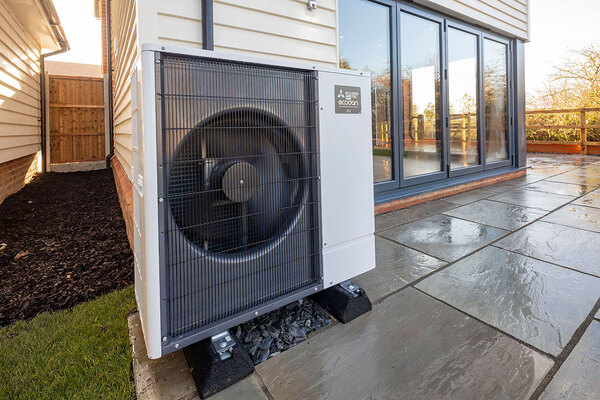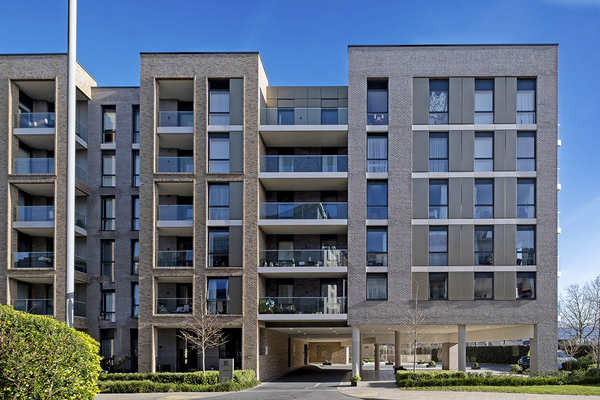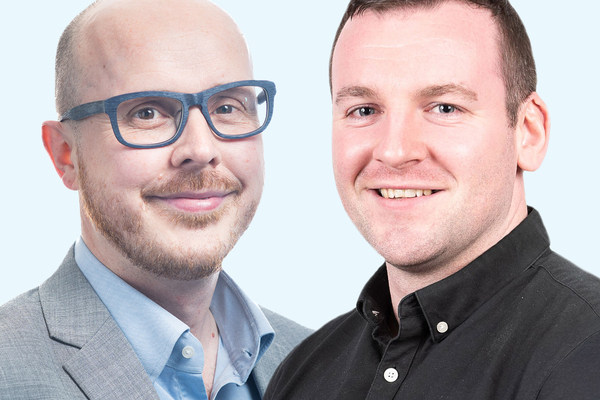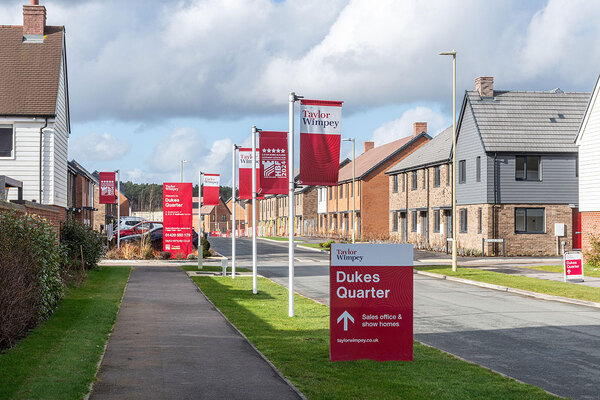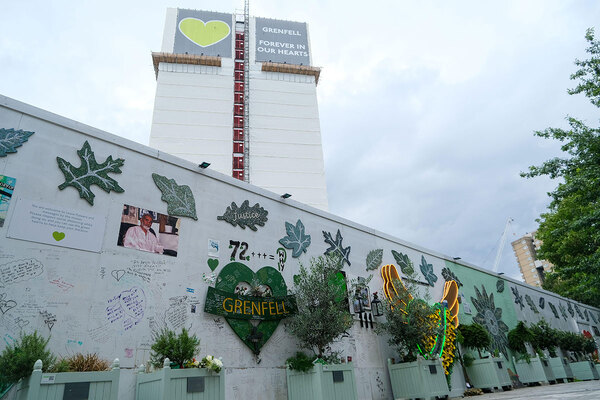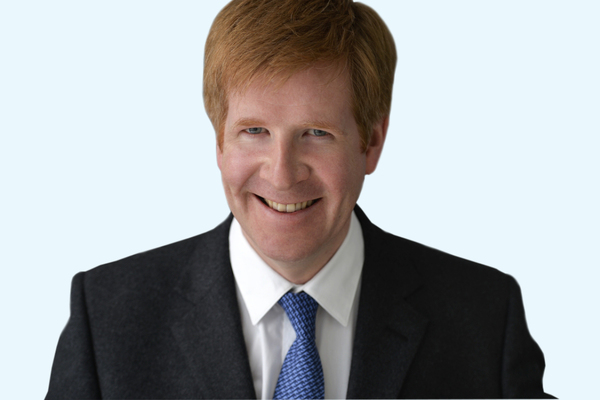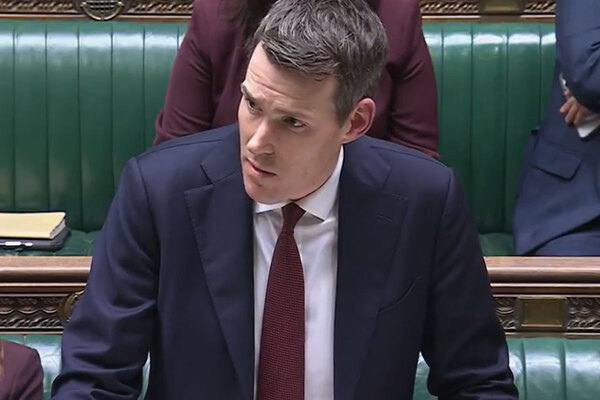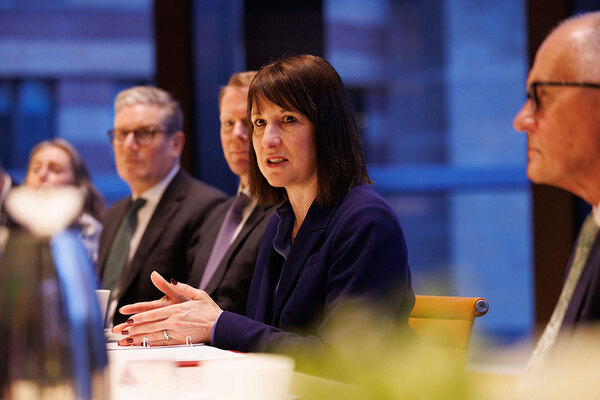Shareholders in Grenfell cladding and insulation firms warned of ‘severe consequences’ if they don’t pay for remediation
Shareholders in the companies which made three cladding and insulation products used on Grenfell Tower have been warned that there will be “severe consequences” for the firms unless they provide “a comprehensive financial package” to help fix unsafe buildings.
Housing secretary Michael Gove has written to investors in Kingspan, Arconic and Saint-Gobain, urging them to use their “position of influence” to encourage the companies to “engage constructively in helping us reach a just resolution for all concerned”.
Shareholders who received letters include BlackRock, Vanguard and Fidelity Management and Research, as well as investors such as Norges Bank, the central bank of Norway.
Arconic made the combustible cladding panels used on Grenfell Tower, which have been identified as the “primary cause” of the rapid spread of fire on the night of the blaze.
Saint-Gobain owns Celotex, the firm which made the combustible polyisocyanurate insulation installed behind the panels, while Kingspan produces the phenolic foam insulation K15, a small amount of which was used on the tower.
The inquiry into the fire heard weeks of evidence about how these firms tested and marketed their products, with lawyers for the bereaved and survivors describing the companies as “little more than crooks and killers”.
But none of them have yet been made to contribute to the cost of fixing thousands of other dangerous buildings around the UK, some of which also use their products.
In the letter today, shareholders were warned that if the manufacturers do not come forward with a comprehensive financial package, then the focus of the Department for Levelling Up, Housing and Communities (DLUHC) “will be trained upon them” and “the consequences for that firm are likely to be severe”.
It comes after Mr Gove forced 46 large private developers to sign contracts committing them to paying for fixes on buildings higher than 11m which they developed. Those who refused were threatened with losing the right to build new homes.
Today’s letter adds that there will probably be consequences for shareholders’ reputations, in addition to their financial stake, if Mr Gove was forced to use “the legal and commercial tools available” to ensure the position of the cladding and insulation companies “becomes extremely uncomfortable”.
Mr Gove also said he was considering whether further tools would need to be handed to regulators or the government.
He said: “I have always been clear that those responsible for the building safety crisis must pay. But despite the fact that their products continue to put lives at risk, some cladding firms have no intention of doing what’s right and addressing their moral and financial obligations to innocent residents.
“Today we ask responsible investors to use their influence to encourage these companies to come forward immediately with a comprehensive financial package for remediation work. It cannot be right that cladding companies continue to profit whilst so many innocent, hardworking people face financial hardship and misery.
“To those cladding companies who fail to do the right thing: you will face severe consequences and I will use all commercial and legal tools available to me to ensure you take responsibility.”
In a press statement today, the government said the Grenfell Tower Inquiry had “uncovered shocking behaviour by the three companies”, including the sale of flammable products that were wholly inappropriate for their end use, apparent mis-selling of construction products through inaccurate marketing information, and misappropriating safety test results, thereby perpetuating the sale of high-risk products (see box below).
It comes weeks after Mr Gove wrote to the bosses of the firms to ask them to meet officials and explain how they will scope, identify and pay for remediation works.
Today, the government said only Kingspan had agreed to meet DLUHC officials and none of the three had yet committed to any new remediation funding.
The department also published an independent review by Paul Morrell and Anneliese Day KC, looking at the current testing regime for construction products.
Kingspan explained that in circumstances where the firm is found responsible for the inappropriate use of its K15 insulation board, and its safe retention cannot be supported by testing, its will pay its share of remediation costs.
Inside Housing understands that the company has offered to contribute to an appropriate joint government and industry-wide scheme, that is equitable and shared across the entire construction industry, to support the wider fire safety issues on buildings where those responsible can’t or won’t pay.
A spokesperson for Saint Gobain added: "Saint-Gobain supports initiatives which are aimed at ensuring that buildings are designed and constructed in such a way that they are safe.
"Celotex, a business within Saint-Gobain Construction Products UK, welcomed and has fully co-operated with, the Grenfell Tower Public Inquiry, which has done and will continue to do much to inform all relevant stakeholders as to where industry standards should be improved and the regulatory regime, and its enforcement, enhanced.
"In addition to measures designed to improve regulations and standards for the future, Celotex acknowledges that redesign and replacement of unsafe cladding systems designed and constructed in the past is a valid objective. However, the solution for achieving that is far from straightforward.
"Saint-Gobain Construction Products UK continues to engage with the Government on these important topics, including responding to Michael Gove’s recent correspondence, and welcome further co-operation with the Secretary of State."
The three Grenfell firms targeted by Michael Gove
Arconic
Arconic’s French arm made and sold Reynobond 55 PE, the combustible cladding panels used on Grenfell Tower.
The material is composed of thin aluminium sheets bonded together, with a core of solid polyethylene, a plastic which is as combustible as petrol.
The inquiry revealed that Arconic had test results from 2004 which showed that it burned fiercely when it was bent into a ‘cassette’ shape, and could not even meet the most basic European fire standards.
This result was repeated in further testing in the 2010s. But Arconic issued no warning to the market, and continued to advertise the product as obtaining a higher standard, which it had achieved in its flat form.
Internally, staff warned of the dangers of continuing to sell the product, saying that the firm was “not clean” and “in the know” about the risks. In 2007, one member of staff speculated about a fire in a building featuring its product killing “60 to 70 persons”.
Arconic obtained a certificate from the British Board of Agrement (BBA) which implied it had met the UK’s ‘Class 0’ standard, despite never having tested the Reynobond 55 PE product to this standard.
Class 0 was, however, an outdated fire classification which allowed many poorly performing products, such as aluminium composite material polyethylene (ACM PE), to pass. The UK government ignored a succession of warnings that the standard needed to be tightened to avoid a catastrophe.
Saint-Gobain
Saint-Gobain owned Celotex, which made RS5000, an insulation material it advertised as suitable for use on high-rise buildings.
The inquiry showed that it had passed a “large-scale test” in March 2014 which cleared this product for use on high-rise buildings as part of one specific wall build-up featuring non-combustible, cement-based external panels.
But despite this limitation, Celotex marketed the product as if it was suitable for use much more widely, and obtained certificates which supported this claim. Former staff members called this practice “dishonest”.
The inquiry revealed that the March 2014 test result had been obtained with the help of additional fire-resisting boards that were added to bolster the external panel and stop it from cracking.
Inside Housing recently revealed that Saint-Gobain also had years of documents warning internally that its product would release toxic, choking smoke when burned.
Kingspan
Kingspan also marketed its product for wide use on high-rise buildings, despite only having passed a single test in 2005 which only cleared it for use in one specific wall system.
It later emerged that the 2005 test was carried out on a legacy product which was no longer on the market. Further tests, which were not released publicly, showed different wall build-ups featuring the insulation failing.
It also secured certification suggesting it could be used more widely, with staff writing internally that they had “thrown every bit of fire test data we could at [the inspector who provided the certificate]”, adding that “we didn’t even have to get any real ale down him”.
Internally, staff said the firm would “sue the arse off” a consultancy that questioned the use of its material on high rises, and said “all we do is lie in here” when discussing other fire-test practices.
Kingspan has emphasised that it has passed several other large-scale tests since the Grenfell fire.
Sign up for our fire safety newsletter
Already have an account? Click here to manage your newsletters
